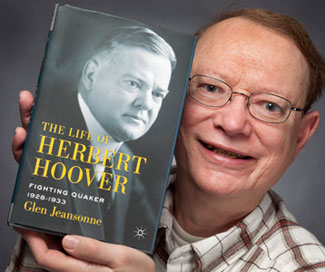
In 1948, Life magazine named the 10 worst U.S. presidents. Time magazine ran a similar list only last year. In each – and in almost every such ranking in between – President Herbert Hoover was included, blamed for not doing enough to end the Great Depression.
But is Hoover’s stained reputation deserved?
A UWM historian, who has published the first new book on Hoover’s presidency in 25 years, says no. In fact, many of the social programs contained in Franklin D. Roosevelt’s “New Deal” were actually conceived or launched by the 31st president. Hoover’s presidential campaign of 1928 even coined the term “New Deal.”
Compared to many of today’s Republican politicians, says Professor Glen Jeansonne, Hoover could hardly be labeled “tea party.” Jeansonne’s book, “The Life of Herbert Hoover, Fighting Quaker, 1928-1933,” was published recently by Palgrave Macmillan. In it, he describes how Hoover grappled with many of the same issues that continue to challenge presidents to this day – welfare, health care and a weak economy. Hoover’s approach to these issues was progressive, says Jeansonne.
Additional Resources
Jeansonne’s website:
http://historyjeansonne.com.
Book Signing:
“History Night”
Friday, May 11, 7 p.m.,
Boswell Book Company,
2559 N Downer Ave.
A supporter of organized labor, Hoover first proposed plans for social security, old-age pensions and medical care in the 1920s. He passed tax hikes for the wealthy and established public works projects, such as the Hoover Dam, during the Depression, but they didn’t last as long as programs during Roosevelt’s administration, says Jeansonne.
Hoover was cautious of overspending because he felt that habitual deficit spending would evolve into the norm, he says. “Once a program was inserted into government, he believed it would be impossible to extract. He also saw the addictive nature of welfare, and also how such policies could end up becoming a political plum for votes.”
Hoover had never held elective office before winning the presidency in 1928. But he was well-known by the public because of his celebrated work in distributing foodin Europe both during and after World War I. As Secretary of Commerce, Hoover raised the profile of this cabinet position and looked for ways to increasing efficiency in business and industry. So recognized was his humanitarian work, Hoover was asked to coordinate disaster relief after devastating floods in the Mississippi Delta in 1927.
“Jeansonne skillfully explains how a man once heralded as the ‘Master of Emergencies’ was later branded as ‘President Reject,’” says Timothy Walch, director emeritus of the Herbert Hoover Presidential Library and Museum. “It’s a cautionary tale of the contradictions between public service and political leadership and Jeansonne tells it well.”
A contentious relationship between Hoover and Roosevelt didn’t help Hoover’s legacy. Neither did Roosevelt’s friendship with Will Rogers, the favorite celebrity of average America at the time. Both publicly criticized Hoover.
Jeansonne believes the amount of misinformation about Hoover that spread – some even permeating textbooks – resulted from the fact that Hoover’s presidential papers were not made public until 1964, a generation after Roosevelt’s papers were made available.
“Much information about Hoover’s presidency was taken from Roosevelt’s library because there wasn’t any other material out there for scholars,” says Jeansonne. “By the time Hoover’s papers were opened, historians weren’t interested anymore.”
Orphaned at nine, Hoover rose to wealth and fame as an international mining engineer, but for most of his years in public service, he took no salary.
Characteristic of his Quaker upbringing, Hoover did not demonstrate much emotion in public nor did he seek credit for his achievements. Uncomfortable with self-promotion and disinterested in perpetuating himself in office, Hoover’s humility and down-to-business style was misconstrued as being dull and uncaring.
“The Life of Herbert Hoover, Fighting Quaker, 1928-1933” is Jeansonne’s eighth book. He has also written biographies of Barack Obama and Elvis Presley (both with David Luhrssen), Huey P. Long, Leander H. Perez and Gerald L.K. Smith, the last book being a nominee for the Pulitzer Prize in biography in 1988.


